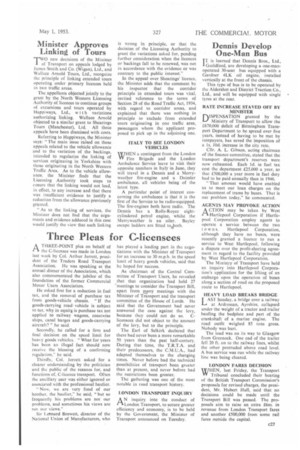Three Pleas f or C-licensees
Page 73

If you've noticed an error in this article please click here to report it so we can fix it.
ATHREE-POINT plea on behalf of the C-licensee was made in London last week by Col. Arthur lerrett, president of the Traders Road Transport Association. He was speaking at the annual dinner of the Association, which also commemorated the jubilee' of the foundation of the former Commercial Motor Users Association.
He asked first for a reduction in fuel tax, and the removal of purchase tax from goods-vehicle chassis. "If the goods-carrying road vehicle is subject to tax, why in equity is purchase tax not applied to railway wagons, coastwise ships, canal barges and goods-carrying aircraft? "he said.
Secondly, he called for a firm and final decision on the speed limit for heavy goods vehicles. "What for years has been an illegal fact should now receive the blessing of a confirming regulation," he said.
Thirdly, Col. Jerrett asked for a clearer understanding by the politician and the public of the reasons for, and functions of, C-licence transport. Often the ancillary user was either ignored or associated with the professional haulier. Now, we are very fond of our brother, the haulier," he said, "but so frequently his problems are not our problems, and sometimes his views are not our views."
Sir Leonard Browett, director of the National Union of Manufacturers, who has played a leading part in the negotiations with the Minister of Transport for an increase to 30 m.p.h. in the speed limit of heavy goods vehicles, said that he hoped for success.
As chairman of the Central Committee of Transport Users, he revealed that that organization had held 27 'meetings to consider the Transport Bill, apart from any meetings with the Minister of Transport and the transport committee of the House of Lords. He said that the Government had never answered the case against the levy, because they could not do so. Clicensees did not object to the amount of the levy, but to the principle.
The Earl of Selkirk declared that there had never been a more remarkable 50 years than the past half-century. During that time, the T.R.T.A. and their predecessors, the C.M.U.A., had adapted themselves to the changing times. Never before had the technical possibilities of transport been greater than at present, and never before had the restrictions been greater.
The gathering was one of the most notable in road transport history.








































































































































































































































